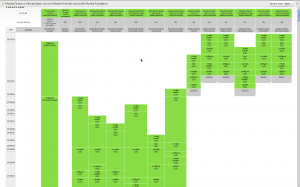In Maliit, all changes have to be reviewed by two people in order to be merged to mainline. This helps us catch issues early and keep code quality high. Since the code is hosted on Gitorious, we use their merge requests feature for that purpose. Up until now we have periodically checked the website for changes (potentially going through each and every one of the repositories), and manually mentioned updates in the IRC channel. This is both tedious and inefficient, so I wrote a simple tool to help the issue: Gitorious Merge Request Monitor
It provides an IRC Bot which gives status updates on merge requests in an IRC channel:
16:01 < mrqbot-AfFa1> desertconsulting requested merge of ~desertconsulting/maliit/desertconsultings-maliit-framework with maliit-framework in http://gitorious.org/maliit/maliit-framework/merge_requests/126
16:01 < mrqbot-AfFa1> mikhas updated http://gitorious.org/maliit/maliit-framework/merge_requests/125 State changed from Go ahead and merge to Merged
One can also query the current status from it:
15:02 < jonnor> mrqbot-7ACeB: list
15:02 < mrqbot-7ACeB> maliit-framework/127: - New - Allow QML plugins to add custom import paths for QML files and QML modules
15:02 < mrqbot-7ACeB> maliit-framework/126: - Need info - configurable importPath for qml
15:02 < mrqbot-7ACeB> maliit-plugins/26: - New - Add PluginClose from main view and add key repetition support
15:02 < mrqbot-7ACeB> maliit-plugins/25: - New - Clear active keys and magnifier on keyboard change
15:02 < mrqbot-7ACeB> maliit-plugins/24: - New - Remove QtGui dependency from libmaliit-keyboard
15:02 < mrqbot-7ACeB> maliit-plugins/23: - New - Get rid of Qt keywords
15:02 < mrqbot-7ACeB> maliit-plugins/22: - New - Add phone number and number layout getters.
Status changes are retrieved by periodically checking the Gitorious project activity feed (Atom)*, and the status itself is scraped from the website. There is no other API right now, unfortunately. Implemented in Python with Twisted, feedparser and BeautifulSoup doing all of the heavy lifting.
Get it from PyPi, using easy_install or pip:
pip install gitorious-mrq-monitor
gitorious-mrq-monitor --help # For usage information
For now this solves the immediate need for the development work-flow we have in the Maliit project. Several ideas for extending the tool are mentioned in the TODO. Contributions welcomed!
